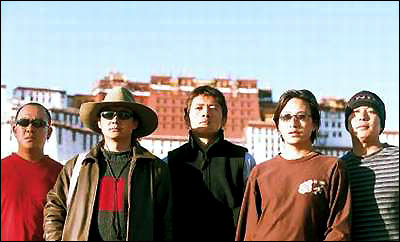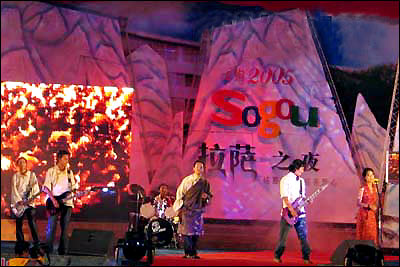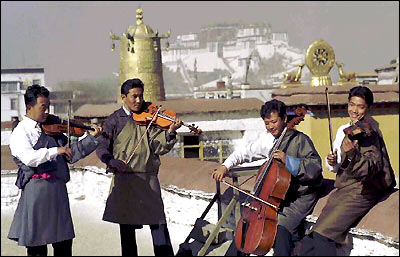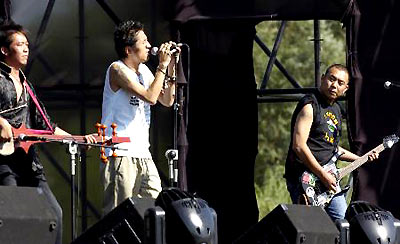| Tools: Save | Print | E-mail | Most Read |
| The Rising Sounds of Tibetan Music |
| Adjust font size: |
Rising from the mists of Lhasa in Tibet is a growing number of musicians and recording artistes who seem capable enough of turning the holy city into the musical capital of China, according to an International Herald Leader report on March 3.
There are suggestions that at least one new singer is born a month in Lhasa. Music stores like the ones along Bakor Street are packed with customers eager to get their hands on the latest hits from their favorite singers. Tibetan pop music forms the ambient sounds of everyday life, hits blaring from loudspeakers in downtown Lhasa. But it isn't only Tibetan music that's getting the air-play. Music fans are treated also to tunes like the theme song of South Korean TV hit Dae Jang Geum; covered in Tibetan, no less, by Kunsang Lhamo, a native female vocalist. Making covers is one of the more effective ways for singers to gain almost overnight popularity. Tenzin Benlo, artistic director of Tibet Music Publishing Co., Ltd told Tibet Commercial that more and more Tibetan music lovers want to make their own albums, something that seems to be increasingly fashionable in Tibet. Not that there is any shortage of music in Tibet. The albums are pouring into Lhasa. But most of those recordings were made in "personal studios" -- big and small, good and bad. There are some thirty privately funded studios, but only seven or eight of these are recognized as working studios in the music industry. There are six noteworthy bands that play original music, four of which have been releasing albums since 2003: rock band, Tian Chu; folk band, Nine-Eyed Stones; country music band, Friends; another rock band, Antelope Horns, formerly known as "Pilgrims"; and pop groups, Tibetan Mastiffs and Hada, both of which haven't released any albums yet. Antelope Horns' self-titled album is said to be the first locally produced album. Releasing albums, there's nothing like actually performing live. But there was nowhere for these talented musicians to jam. Not until last August, when Snow Pile White opened. The bar has since then become the de facto practice "studio" for bands that play their own music. On November 4 last year, Cui Jian, the godfather of Chinese rock 'n' roll, gave several performances at the bar, shooting it almost immediately to fame.
"Snow Pile White is where we usually perform now," Tashi Phuntsok, Tian Chu's lead singer said. "Of the bars here, this is the only one with the equipment and facilities for live performances. This is the only reason why Cui Jian's gig made an impact." In a telephone interview, Song Ming, the owner of the bar told International Herald Leader: "Mine is the only music-themed bar in Lhasa, and the only one that promotes original music. Tian Chu is the best local band I know, and I hope that they and other bands like them can share their music through channels like mine." But Tian Chu isn't the only band making waves in the Chinese music scene. Nine-Eyed Stones, which plays a very different sort of music, could be considered to be just as popular in its genre. Tian Chu is putting together its second album containing songs sung in Tibetan and Chinese; Nine-Eyed Stones is also in the process of cutting its third album to be sung in Tibetan, Chinese and English. These two bands hold a lot of promise for Tibetan music, but the question now is whether they should leave Lhasa to develop their music further. Renowned Tibetan music guru, Ya Don, who runs his Ya Don Eagle Music Studio out of Chengdu, Sichuan Province, said: "I’m very interested in all types of ethnic music. Tian Chu and Nine-Eyed Stones both sing about their own people and their ethnic characteristics, which is fantastic! I look forward to collaborating with both these bands." However, the members of Nine-Eyed Stones don't read music. "This is a common problem among Tibetan musicians. I think they prefer to rely on their instincts and improvise. I'm willing to communicate with them. I'll try to remember how it was for me before I learned to read music!" Tenzin Benlo who is also a music composer who set up one of Lhasa's first private studios said that there is no lack of singing or musical talent in Tibet."I think Tibetan people's musicality is innate. No one has a problem with pitch when they sing." Benlo's studio produced over 10 albums last year, of which the ones for Gon Pho and Danpa Darje were the most satisfying. These two singers sing mainly in Tibetan, sometimes in Chinese. To Benlo, there is something in their singing that sets them apart from the usual pop song: "Theirs is original Tibetan New Music." But Benlo stressed that he is not in a rush to promote and commercialize this genre just yet. "It depends on what the music fans want to hear." However, he does acknowledge that more could be done to promote Tibetan music. The only international exposure it's had has been through musicians from Hong Kong or Taiwan, for example, who have used the mysterious and spiritual Tibetan sound as inspiration for their work. Perhaps it's precisely that mystery and spirituality that have garnered international acclaim for artistes like Zhu Zheqin (also known as Dadawa) and her world music hits Sister-drum and Voice from the Sky. One can only hope that that mystery and spirituality can help Lhasa realize its dream of becoming a music hub.
(China.org.cn by Zhang Rui, March 17, 2006) |
| Tools: Save | Print | E-mail | Most Read |
 |
| Related Stories |
|
| Product Directory China Search |
Country Search Hot Buys |



